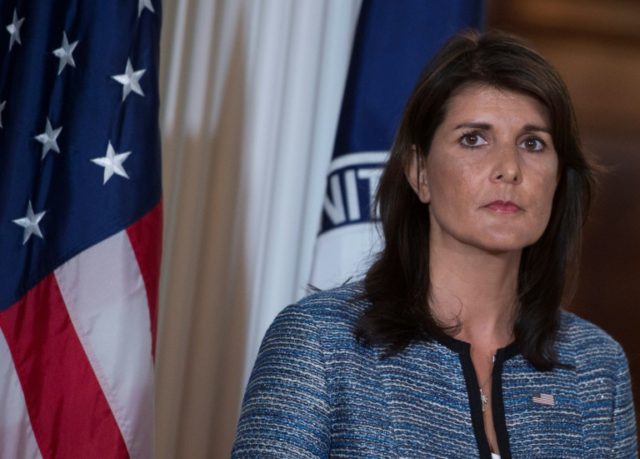The United Nations General Assembly opened on Tuesday with a bit of American political controversy, as the White House appeared to back away from U.N. Ambassador Nikki Haley’s proposal for a Security Council session to “address Iran’s violations of international law.”
The United States currently holds the rotating chairmanship of the Security Council, providing President Donald Trump with his first opportunity to chair a meeting. Two weeks ago, Haley proposed convening a session on Iran that might have brought Trump face-to-face with Iranian President Hassan Rouhani, who would most likely have been invited to attend.
“It’s hard to find a place where there is conflict and Iran isn’t in the middle of it. We think they’ve been ignored and given a pass for too long, and we think it’s time for Iran to stand up and explain themselves,” Haley said on September 4.
Haley acknowledged that some other Security Council members, notably Britain and France, could be put in an awkward position during such a meeting because they still support the Iran nuclear deal after American withdrawal, and they generally regard Iran as less of a regional and global menace than the United States does. (Also, to put it mildly, the current U.S. administration holds a dimmer view of Iran than its predecessor).
Iran has been making increasingly strident demands of the other nuclear deal partners to provide it with relief from U.S. sanctions, especially after a much tougher round of sanctions hits in November.
“I understand that there are some members who find that uncomfortable to talk about. I personally think that when we talk about things that are uncomfortable at the Security Council, good things happen,” Haley said.
CBS News reported the rest of the Trump administration began backing away from Haley’s idea almost immediately:
Just three days later, the U.S. Mission to the U.N. said the meeting would focus on a “broader range of issues,” including the “proliferation of weapons of mass destruction,” in addition to Iran’s alleged sanctions violations. According to a Security Council diplomat, Russia had objected to a Security Council meeting focused on singling out a single nation.
The fact that President Trump could get an earful from the four European nations on the Council who strongly object to his administration’s unilateral withdrawal from the 2015 Iran nuclear agreement may also have been a factor in the evolving agenda.
The Washington Post on Monday reported the administration has “disowned” Haley’s plan, although no administration officials were quoted rebuking Haley or explicitly ruling out her proposal in the article. Instead, various unnamed diplomatic sources are quoted stating that the U.S. decided on a broader and less confrontational agenda for the Security Council meeting, possibly under pressure from the U.K. and France, which did not relish the prospect of defending the Iran nuclear deal and possibly provoking an angry response from President Trump.
The Post’s sources also said a broader agenda would eliminate the need to invite Rouhani to the Security Council session, stave off Russian objections to the Council singling out Iran from criticism, and give the U.S. more room to focus on the hotter topics of North Korea and China.
Suzanne Maloney of the Brookings Institution told the Post that both Iran and the United States would benefit by walking back from Haley’s proposal.
“In sparing Trump this awkward scene, his advisers also gave a reprieve to the Iranians, whose leadership faced an unpalatable choice between the domestic political indignities entailed in sending the foreign minister or another official to try to rebut its vilification and the nearly equally unpleasant fallout that would have been incurred by letting the insults go unrebutted,” Maloney said.
The opposition National Council of Resistance to Iran argued on Tuesday this is no time for the world community to go wobbly on the tyrants of Tehran
This Islamic Republic of Iran is mired in crises, and pressuring it while it is vulnerable is a viable strategy.
The rial, Iran’s national currency, is trading at more than 150,000 to the US dollar this month, which sparked more economic protests across Iran, as the country is wracked by protests that began late last year.
The economic catastrophe is seen as part of the broader failings of the Iranian government, and the protests are sending a clear message of opposition to the regime in its entirety.
The opposition argues that Iran’s people are hungry for signs the free world stands behind them and will expect the United Nations to denounce repression and human rights violations against protesters. That might be difficult for the Europeans with so much money riding on what remains of the Iran nuclear deal, and so much political prestige invested in keeping it alive.
On the other hand, if President Trump and Ambassador Haley ease up on their outspoken criticism of the regime in Tehran, their reticence will be duly noted in every political quarter of Iran.

COMMENTS
Please let us know if you're having issues with commenting.